What would happen if we ended up as the only country, apart from the United Kingdom, to remain a constitutional monarchy owing fealty to William V with a potential George VII as the Prince of Wales next in line? Maybe it will not be that long to wait. Maybe climate will beat us all.
We can keep kicking this prospect down the road because every potential solution depends on a level of trust but within the parliaments of Australia festered by the Murdoch Press, there is too much venom for there to be cross-party agreement at present.
Albanese is tainted by being on the left; a nominal Republican, not a member of the Establishment yet trying to compensate with his apparent obsequies; but Prime Ministers do not seem to last for that long a time. In any event, Albanese has chosen to become immersed in the web of Aboriginal politics, which has the very uncertain hand of Linda Burney to guide it.
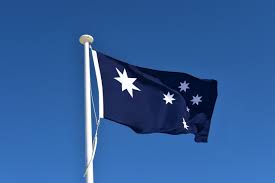
The danger for Australia is that we become an anachronism – a legislative curiosity. A country which once prided itself on its youth, until the Aboriginal agenda kept banging on about being the oldest civilisation on Earth, with the least material evidence of its longevity, but with the dangerous heresy of consigning Cook and us Anglo-Celtics to some monarchist Hell. The anachronism being the last constitutional monarchy owing fealty to a sovereign who never comes, who never barracks for Australia and ours being the last country to have the Union Jack incorporated into its flag.
Thus, for the purpose of this thesis let’s create our own Head of State called a President, with a fixed term of five years with no extension. Precedents for a casual vacancy abound in every relevant legislation.
I suspect that one of the biggest hurdles in appointing a Head of State called a President, apart from timing, is to determine the people who would choose such a Head of State. One suggestion; not that original – since Australia is a Federation – we would either choose 12 or 16, assuming the panel to be gender neutral and thus two selected from each State and Territory.
I believe that a jury system would be the best, and thus no more than 16 electors chosen at random from among those entitled to vote would be an appropriate Committee; the jury system has stood the test since mediaeval times. The Committee lottery would be run by the Electoral Commission. The only conditions I would recommend are that:
(a) everyone chosen has the opportunity to refuse,
(b) only expenses would be paid,
(c) those chosen must be both literate and fluent in English, and
(d) the process takes one month from closure of applications (if they are allowed).
For instance, there are always moneyed someones intent on manipulating campaigns for potential applicants. It then becomes a popularity contest; or just a quasi-Presidential campaign with political overtones.
The above sentence encapsulates the impossibility of the task, unless rules are made such as there is limited time to agree a course of action.
The KIS principle can be quickly compromised; think how simple nominating the next Governor-General is: one person makes the recommendation for the next incumbent. However, that recommendation – in the context of a transition to a Republic – is made to the very person who Australia is trying to remove. So how do you remove that person from the process?
I’m glad that I won’t be asked to devise the process; thankless, thankless task, as inevitably you are always wrong in making any such decisions.
Nevertheless, there must someone courageous enough to make the decision. After all, the Governor-General is recommended by the Prime Minister. In my lifetime, since we gave away titled British men in the role, there have only been two complete duds, and one of those lasted barely a year. Geoffrey Robertson, in this opinion on the future of a transition from Governor-General to President, questions whether we need one anyway – and he cites the stumbling General Hurley, whose recent actions, on the surface, seem completely reprehensible.
One final thing. I hope Australia will not be the last to abandon the Union Jack, and in so doing change Australia Day from January 26. However, given the cultural cringe from which this country has never divested itself, I would not bet on it.
When you are Young
I thought this reflection appropriate for this time when I was one of a group who met the then Philippines President, Ramon Magsaysay. At nearly six feet tall, Magsaysay was tall for a Filipino; I remember him as a person who embodied the concept of “charisma”.
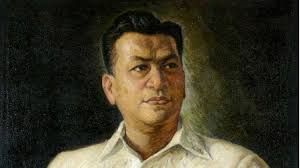
It was a few days after my seventeenth birthday, and the invitation came as somewhat of a surprise. It was the first time I had met someone who had been a genuine war hero. He had stayed behind in the Philippines to fight the Japanese, whereas McArthur was evacuated to Australia. Yet for our visit there were no photographs, no autograph, no memorabilia. It had been an impromptu visit, but where some business was obviously transacted under cover of a cup of coffee.
Magsaysay’s life was cut short; he was killed in a plane crash in March 1957 near Cebu. Sabotage was suspected. The Communist insurgents, the Huks, were high on the list of suspects. Nothing was ever proved. President Eisenhower expressed his condolences. Magsaysay was to be his guest in Washington.
This following excerpt is contained in my memoir about that momentous year 1956, titled “Scars of ‘56”.
A couple of days before we were to leave, there was a sudden invitation to meet the President. There was some unexplained link between the Da Silvas and the new President, Ramon Magsaysay. His name meant little to me, except that I knew he was supposed to be charismatic.
Charisma – what a great word? Charisma has no greyness. It could inspire you to be either good or evil, depending on which path the charismatic leader took you down. Later, in the Presidential Palace staring at Magsaysay, I knew I had found the meaning of the word and, for a time, he was my model of charisma.
This time, cars came to pick us up. There were enough vehicles for Gay and me to sit together in the back seat. My father seemed to make that decision and assured her family that he would ride with us, but in the end he took a lift with the Da Silvas and Gay and I had the car to ourselves. We were all dressed up. I noticed that Gay was wearing gloves. We sat apart – her gloved hands on her lap. I sat on my hands.
The Presidential Palace was really only a fine house; it was not palatial. Magsaysay had been careful not to be extravagant. He was very much a man for his people! He had been a war hero, staying behind in the Philippines and then continuing to fight the Japanese. It was a point emphasised by the Da Silvas.
The President was a man with keen smiling eyes who strode down the line of those being introduced, looking intently at each face. What do you say to someone who makes you feel good for a fleeting moment but then before you can say anything he has passed to the next person?
Nothing of moment as it turned out, but as I waited to be introduced it prompted me to wonder about what important people said to their subjects.
I had once seen our Queen talk to one of the soldiers in the line. What did she say? It intrigued me. I pondered whether the soldier was asked about what he was interested in, and whether the response could be so interesting that the whole itinerary would stop while he explained the complexities of how unique he was in his pursuit of collecting football cards and that he had only number 54 to get.
Normally the Queen would be ushered up and down the line of soldiers standing at attention, with the normal pomp and circumstance. But what would happen to the pomp and circumstance if she suddenly engaged in an animated conversation with one soldier?
My mind flashed back again to that bloody awful experience on Anzac Day the previous year, when I was standing either “at attention” or “at ease” for hours. No Queen here; just the butt of a lot of comments from the passing parade of men in ill-fitting suits. At least the Queen would be courteous. I assumed that was the same as being regal.
Then, at last, it was my turn to be face to face with the President. It was my first experience of being noticed by somebody important.
However, all the great man did say when he met me was; “you look like a fine Australian young man, pleased you could come. Hope you enjoy your stay.” And that was all! At least he avoided “boy”.
There was no condescension. His gestures were all so fluent, and the smile was one of momentary engagement that made the recipient feel good; and then he had moved on.
My response was thus lost on the shoulder of the next person, whose hand was clasped, and for whom he had the same sort of a greeting, although in this instance it was Gay.
He did spend a few more moments with her than he had done with me, and on reflection the handshake was more raising her hand towards his lips, and then dropping it softly. I continued to watch him – the first politician I had seen at close range. He seemed to know the Da Silva family quite well, and he drew the father off through a door that led into the garden. He had such an easy way of moving between people, of communicating.
My observation was interrupted. “Coffee or tea, sir?” I said “Coffee, please”. After all, black coffee was always the drink you had in smart company after a meal, with a slice of lemon.
All the time, while I sipped my coffee, I kept staring at the President. The only person remotely as engaging – as charismatic (that word would be over-used in my vocabulary for a time) – was my headmaster, who used his large build to reinforce the power he wielded. Ramon Magsaysay was a man who did not use power as a blunt instrument. This man had finesse. You knew that you were in the presence of a man (and it was that kind of world then, when “man” was synonymous with “person”) who knew he had power. It was just the difference in the ease with which they responded.
We finished our afternoon visit and were driven back to the ship. It was all done with white gloves and gaiters; there was that tinge of the military, all politeness and efficiency in moving the guests across a city where the traffic was chaotic and the world less than polite. The Presidential car just sliced through. I thought it impressive; any kid would. However, that was the prize for power I thought. To do what you liked. But in this man, authority was not the same as arrogance.
The Ngarrindjeri
The Naturalization Act 1903 explicitly prohibited naturalisation of anyone with ancestry from Africa, Asia, or Oceania (except New Zealand). Indigenous Australians who did not already have their names placed on a state electoral roll on the date of federation in 1901 were prohibited from enrolling to vote until 1962.
Being an Aboriginal person in South Australia at the time of Federation meant you were entitled to Australian citizenship. As the then Governor of South Australia, Sir Eric Neal, proudly informed a group of us once, the South Australian Aboriginal had the advantage over others of being able to vote in Federal elections as a result of universal suffrage legislation passed in 1858, which stated that all born South Australians including Aboriginals were granted citizenship.
The Ngarrindjeri were the Aboriginal nation at the mouth of the Murray River, extending down the Coorong and yet with links with Port Pearce, a tiny settlement on the Yorke Peninsula, on the fringe of the copper towns.
Their settlement on the Murray River, Raukkan, or its Anglicised name of Point McLeay, had begun as a mission for the Ngarrindjeri.
I mentioned Raukkan in a previous blog about bark canoes, which is indicative of how resourceful these people are.
They built more or less permanent shelters. Some say they used logs, evoking the concept of the log cabin. On the contrary, the early illustrations still emphasise the structural bower nature, just a more complex gunyah. There are illustrations of some of these shelters, which included whale bones as struts. Despite living in a fertile part of Australia, as described by the early white settlers (to which I referred in an earlier blog), there was always enough food without having to cultivate crops.
When we visited Raukkan, there were a number of stone buildings one of which, the Church, is illustrated on the Australian $50 note. In the forefront from a late 19th century photograph are shown two Aboriginal elders, Milerum “Clarence” Long and Polly Beck, dressed in whitefella (grinkari) clothes.
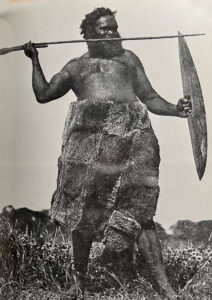 Yet the Ngarrindjeri had their own clothes – an Aboriginal clothed neck to ankles in a toga of possum skins, a woven dilly bag slung over his shoulder, carrying a nulla in one hand and a shield in the other cuts an impressive figure. Other early illustrations show people with woven seaweed cloaks. These were skilful sophisticated hunter/gatherers.
Yet the Ngarrindjeri had their own clothes – an Aboriginal clothed neck to ankles in a toga of possum skins, a woven dilly bag slung over his shoulder, carrying a nulla in one hand and a shield in the other cuts an impressive figure. Other early illustrations show people with woven seaweed cloaks. These were skilful sophisticated hunter/gatherers.
Of course, the man on the $50 note is David Unaipon, a Ngarrindgeri man, who has been characterised as being the Aboriginal “Leonardo Da Vinci”. I visited his grave overlooking Lake Alexandrina with Henty Rankin, one of the elders. The fact that images of Unaipon are freely available is unremarkable since lining the walls of the Ngarrindjeri offices are portraits of past elders as one would find in grinkari boardrooms.
George Taplin is the most prominent whitefella or grinkari associated with the development of Raukkan as a mission. He came there as a zealous teacher in 1853, became ordained as a Congregationalist Minister and immersed himself in the culture and became fluent in the language which he transcribed. He lived the rest of his life among the Ngarrindjeri.
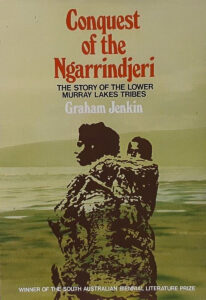 Uncle Henry Rankin gave us a copy of the book “Conquest of the Ngarrindjeri” during a visit just before Christmas in 2000. He had been significant in maintaining the integrity of the community – a community whose members are spread far and wide and who are prominent members of the South Australian community. This edition was an update of the original work written by a University of South Australia academic, Graham Jenkin. Originally published in 1979, it won the Wilke Literary Award for non-fiction; the second edition was published by Raukkan itself in 1995.
Uncle Henry Rankin gave us a copy of the book “Conquest of the Ngarrindjeri” during a visit just before Christmas in 2000. He had been significant in maintaining the integrity of the community – a community whose members are spread far and wide and who are prominent members of the South Australian community. This edition was an update of the original work written by a University of South Australia academic, Graham Jenkin. Originally published in 1979, it won the Wilke Literary Award for non-fiction; the second edition was published by Raukkan itself in 1995.
There is no doubt that the Ngarrindjeri were nearly destroyed by the mission system, despite people like Taplin. That mixture of disdain and paternalism, the removal of children, the dispossession of land, were encouraged by the mission system. The introduction of measles, TB and smallpox, amid a litany of diseases, increased the destruction.
Yet despite all this, the Ngarrindjeri nation have not only survived but been significant contributors to the whole Australian nation.
The Angel Falls if it ever existed outside Venezuela.
This action indicates that Trump has spawned a legion of nasty smart-arses, soul-destroyed individuals who enjoy the sadism of the initiation rites abundant wherever there are male tribal gangs; among other processes, the time-honoured desensitising process inter alia spawned the Leaders of The Universe – that is, until Women have said “enough”. But not all and not quite enough.
Below is a distillation of the Boston Globe and Washington Post reports – get angry!
Venezuelan migrants filtered in and out of St. Andrew’s Episcopal Church on Martha’s Vineyard Thursday morning (last week) after arriving Wednesday on planes dispatched by Florida Governor, DeSantis.
The migrants believed they were headed for Boston.
Eduardo, a 25-year-old undocumented migrant from Barquisimeto, Venezuela, said he set out almost three months ago and eventually reached San Antonio. He stayed in a shelter for a week and a half, but authorities were going to expel them, until, he said, he received word that he could go to Boston.
“At first they said it was to Boston,” he said. But “during the trip, the captain of the plane said the name [of] here — of the island. And well, most of us, we were all surprised because, as they had said Boston, and they threw us here on the island.”
What kind of guy would put a bunch of vulnerable people on a plane under false pretences and dump them on some island off the coast of Massachusetts?
The next Republican nominee for President, that’s who.

Florida Governor Ron DeSantis, who’s been itching to supplant Donald Trump as the GOP’s standard-bearer, made Trump’s border wall stunt look like child’s play by putting about 50 undocumented Venezuelan migrants on charter flights and depositing them on Martha’s Vineyard, summer playground of the liberal elite.
The migrants were told by the flight’s organizers they were going to Boston. They were told they would receive work papers.
It’s an outrageous ploy, an episode of “House of Cards” written for Fox News. Instead of Kevin Spacey pushing someone in front of a train on a fictional TV show, DeSantis lured a bunch of poor people onto a plane in real life.
To right-wingers, the Vineyard is Sodom and Gomorrah with lobster rolls and soft serve.
Hell, the Obamas own a mansion there. What could be better?
Maybe Nantucket, but then there’s a lot of Republicans who own second, third, and fourth homes on that island, and DeSantis held a fund-raiser there last month, so maybe not.
The Vineyard, where the Birkenstock-wearing lefties have shunned Harvard Law professor Alan Dershowitz because even though he’s a liberal he’s defended Trump, checked every box.
You’ve got to give DeSantis credit. The only way his fellow immigration huckster Governor Greg Abbott of Texas can one-up him at this point would be to parachute a bunch of undocumented Hondurans onto Harvard Yard.
As right-wing political theatre, the DeSantis move is a hit, a blockbuster, pure conservative gold. As his spokesman told state media, aka Fox News, Florida gladly picked up the tab to fly the migrants to the Vineyard because Massachusetts is a sanctuary state.
Fox ran a story crowing about dumping the migrants on “ritzy” Martha’s Vineyard.
Oak Bluffs is ritzy? Who knew?
According to DeSantis, liberals in the People’s Republic of Massachusetts talk a good game, sticking up for undocumented immigrants with virtue-signalling rhetoric, while red states like his bear the cost and burden of taking care of them. Kind of like how every state, including Massachusetts, regularly picks up the tab to repair Florida when it gets wrecked by a hurricane.
Cynical? You bet. And it plays well with the crowd. At least to those who get their information from right-wing outlets that scare the hell out of their viewers by claiming the southern border is a free-for-all that has gotten out of control since Joe Biden was elected.
This was literally political theatre: a videographer who just happened to be there when the migrants arrived on the Vineyard shot video that appeared almost immediately on Fox News.
If you think it’s in poor taste, or even morally reprehensible, to use desperate people to score political points and make a propaganda film, then you haven’t been paying attention.
This is all about owning the libs. Scoring points is the point. Using vulnerable people is, for craven politicians like DeSantis, just a case of the ends justifying the means. While most people will see this as shameless and shameful, the DeSantis crowd considers it a justifiable exercise that showcases liberal hypocrisy.
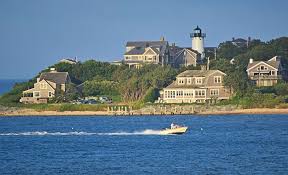
Unfortunately for DeSantis, the good people on the Vineyard messed up his script. They pulled out all the stops to welcome, feed, and accommodate their unexpected visitors. Their compassion was as spontaneous and generous as DeSantis’ act was calculated and cruel.
State Representative Dylan Fernandes and State Senator Julian Cyr, who represent the Vineyard, were as proud of their constituents as they were disgusted by the political game that forced them into humanitarian mode.
“What better rebuke to this shameless political stunt than a community actually rallying to help people and recognizing and appreciating their humanity and dignity,” Cyr said.
Dignity? You won’t find any in the corner office of the shady state of sunny Florida.
The Commonwealth of Massachusetts’s humane response forms a “work-in-progress” epilogue for the DeSantis “dog” act. The Florida Governor may have committed a felony by this act.
Note: Governor Charlie Baker is Republican. There are thus humane Republicans
The roughly 50 Venezuelan migrants flown unannounced to Martha’s Vineyard Wednesday in what critics derided as a cruel political stunt by Florida Governor Ron DeSantis are now being offered temporary shelter at Joint Base Cape Cod, the Baker administration announced Friday.
The state will offer the migrants transportation to a temporary shelter on the base, which is located in Bourne. The move will be voluntary, the administration said in a statement. Governor Charlie Baker is prepared to mobilize up to 125 members of the Massachusetts National Guard as part of the relief effort.
Mouse Whisper
I thought it appropriate to reprint the final paragraph of a eulogy to one Arnold Mouse of Brooklyn from the New Yorker.
Though he favoured family-size bags of chips, Mousey leaves behind no rodent relatives, as he was the only mouse that’s ever lived in my apartment. Rest in peace, Mousey. You won’t be missed, but whenever I hear a scratching sound in my wall like the one I’m hearing right now, I’ll think of you.

